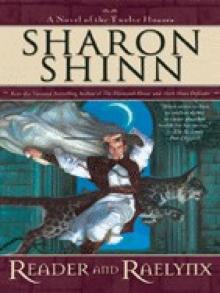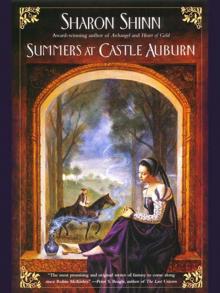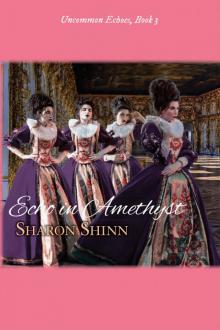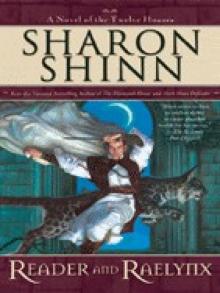- Home
- Sharon Shinn
Nocturne Page 2
Nocturne Read online
Page 2
Page 2
I glanced over my shoulder toward the hallway that led to several doors, one of them guarding the root cellar. “Last night. Three times. That door would creak open as if someone was coming upstairs. I kept going over to push it shut, and it would come open again. Then I kept thinking I could feel someone staring at me, but I’d turn around, and no one was there. ” I offered a small shudder. “It just—made me uncomfortable. ”
Judith nodded. “That happened to me a couple of times when I worked in the kitchen overnight. I just learned to ignore it. ”
Rhesa, who was scrubbing spills off the great iron stove, glanced over her shoulder uneasily. “That door never swung open while I worked here alone. ”
“There’s plenty of places around this school that give me the shivers,” said a heavyset, vacuous man named Elon. He was middle-aged and wholly devoid of personality; I sometimes wondered if he’d arrived as a student when he was sixteen and never had the energy to leave. “I don’t like the barn at night. Or the library. ”
Deborah snorted. “Not one of them is as peculiar as the Great House,” she said.
I pretended to frown. “Why? What’s wrong with the Great House?”
Rhesa grimaced at me. “It’s creepy. ”
“Well, it’s old and tumbledown,” I said. “And I know none of us is supposed to go over there. ”
“And haven’t you ever wondered why?” muttered Elon.
I shrugged. “I thought Headmistress liked her privacy. ”
Deborah snorted again. “She likes to keep everyone in the school safe,” she corrected. “That place is haunted. ”
I wasn’t the only worker who exclaimed aloud at this. Haunted! You’re saying there are ghosts at the Great House? Who are they?
Deborah waved a hand for silence and we all fell quiet. “I’ve been here twenty years, and I’ve never set foot in that building,” she said dramatically. “And I heard tales about it from the day I arrived. People would see lights flashing in the upper windows. They’d see shapes moving on the roof. There would be sounds—terrible, groaning sounds—and the noise of glass breaking and voices shouting. But only at night. In the morning, it would all be peaceful again. ”
She glanced around as if to make sure she had everyone’s attention, but we were all rapt. “Of course, you’d think all those disturbances were caused by a ghost, but that’s not what people believed. They said there was a live man there—sick—hurt—maybe mad—cared for by the woman who used to be headmistress, back when I was a girl. A man everyone would recognize, if they could see his face. ” She nodded for emphasis.
“Who was it?” Rhesa demanded.
Deborah dropped her voice to a whisper and we all leaned in to hear. “The old Archangel. ”
“Gabriel?” Elon asked.
Deborah shook her head. “Raphael,” she breathed.
She met with stares of disbelief. “That can’t be,” Judith said. “Raphael died when Mount Galo came down. ”
“And he was ancient,” Rhesa added.
Deborah frowned, clearly not liking our skepticism. “Everyone believed he died when the god threw the thunderbolt against the mountain,” she said in a stronger voice. “But he didn’t. He was disfigured and crippled, but he survived. And he was brought here to this remote place to live out his days in obscurity. ”
“But Rhesa’s right,” Judith objected. “He was fifty or more when the mountain was destroyed, wasn’t he? And that was almost seventy years ago. So even if you came here twenty years ago—”
I could see her struggling with the math, but I had already done the calculations. Twenty years ago, Raphael would have been roughly a hundred years old. And even if he had survived those legendary events, he would have been mightily bruised and broken. Every schoolchild learned the story of the time Jovah smote Mount Galo and almost destroyed the world. As the god required, all the people of Samaria had gathered in the mountain’s shadow on the Plain of Sharon, prepared to sing the annual Gloria to prove to the god that they were living in harmony. But Raphael had been unwilling to hand over his title of Archangel to Gabriel. He claimed there was no god. He claimed that Jovah would not, as promised, strike the mountain, and then the river, and then the world, if the Gloria was not sung. But when twilight fell, so did the thunderbolts, and the mountain was blown apart. No one had ever seen Raphael or any of his followers again. Not even, I was pretty certain, the former headmistress.
But it was interesting to contemplate the idea of some angel taking refuge in the upper stories of the Great House. That would explain the shape of wings. That would explain the heart-wrenching snatch of music. Angels pray to Jovah through song—they fly into the heavens and plead for him to send rain or sunshine or medicines or grain, whatever is most needed at the moment. All of them possess voices so beautiful you might weep to hear them.
So I was prepared to believe I had spotted an angel on the roof of the Great House. It just wasn’t Raphael.
Deborah was trying to convince the doubters. “Angels live a very long time,” she said firmly. “A hundred years would be nothing to one of them. ”
Judith—who I suspected had more experience with angels than Deborah did—said, “Maybe, but I never heard of any of them living a hundred and twenty years. Even if it was Raphael there at some point, he can’t possibly be there now. ”
“No, but his spirit is,” Deborah snapped, clearly annoyed. “It haunts the place. ”
“Still?” I asked, trying to sound frightened instead of speculative. “That is—do people still hear voices and—and see shapes?”
“I never have,” Elon said.
“Me, either,” Rhesa added.
I glanced at Judith, and she shook her head. Judith was a thoughtful and observant woman. If she hadn’t noticed any spirits lurking around, then there hadn’t been any on the premises for at least five years.
“Sometimes the spirits lie quiet,” Deborah said. “And sometimes they are stirred up again. You should feel grateful that you live at the Gabriel School during a time when no ghosts are walking. And as long as all of us stay behind the fence, the ghosts should remain quiet, and everything will be fine. ”
Rhesa turned back to the stove, already grumbling. “Well, I don’t mind not poking around the Great House, but I’m awfully tired of staying here all the time,” she said in a voice scarcely better than a whine. “There’s nothing to do. I want to go to Telford or Stockton, or even Breven, just for a day or two. ”
“I wouldn’t mind a trip to Stockton myself,” Judith said. “If I don’t get another pair of shoes pretty soon, I might just as well go barefoot. ”
That quickly turned the conversation from spirits to shopping, but I didn’t mind. I had learned what I needed to know.
The Great House—isolated, mysterious, and brooding—served as more than just the lodgings for whoever was current headmistress of the Gabriel School. It was a haven for broken angels who needed somewhere to rest and recover. I strongly doubted that a ruined old Raphael had ever lived in its upper stories, but I was willing to bet that, over the past seventy years, an assortment of angelic occupants had taken refuge there.
And one was living there now.
I wondered if it was one I knew.
I would have to be very, very careful.
For the next three weeks, I was obsessed with watching the Great House, trying to get another glimpse of the angel, while making very sure he did not catch sight of me. I kept up my usual routine, except now instead of using any free hours to explore the rest of the compound, I spent them patrolling the patch of fence that served as a border between the school and the house. We were not quite done with winter, so the weather veered from temperate to frigid and back to mild. Some of the nights were so cold I could only stand to be outside for ten minutes.
Twice during that period, I saw the angel again.
The first time was probably a w
eek after our conversation in the kitchen. The half-moon still produced enough light to see by, and the weather was moderate enough to make a midnight stroll bearable. As before, I came to a standstill and wrapped my fingers around the iron bars, though this time I stood in the shadow thrown by one of the school buildings, so that I would be difficult to see. I stared up at the Great House, willing it to spill its secrets.
And I saw a shape rise up from the rooftop as if conjured by faith and longing. It was an angel, all right—there was no mistaking the silhouette. An angel who stood with his head thrown back and his arms upraised and his wings swept back, in an attitude that could not have more plainly bespoken supplication. He stood that way for five minutes, for ten, and then turned abruptly away with the banked rage of a man who knows his prayers will not be answered. Suddenly he pitched to his knees, tripped up by some obstruction on the roof that he had overlooked in the chancy light.
Or—no. Tripped up by something he had not noticed because he could not see. I watched as he rose cautiously to a standing position. I saw him stretch his arms out, as if seeking a wall or handhold; I saw him glide his right foot forward, as if testing the surface ahead for other hazards he might have missed. The fall seemed to have disrupted his sense of orientation. He tilted his head, as if listening for the way the evening breeze played around the surfaces of the roof, then felt his way slowly toward a specific point. It must have been a door that led to the interior, because almost instantly he dropped out of sight and did not reappear.

 Jenna Starborn
Jenna Starborn Troubled Waters
Troubled Waters The Thirteenth House
The Thirteenth House Reader and Raelynx
Reader and Raelynx Angel-Seeker
Angel-Seeker Archangel
Archangel Jeweled Fire
Jeweled Fire Nocturne
Nocturne The Shape-Changer's Wife
The Shape-Changer's Wife Still Life With Shape-Shifter
Still Life With Shape-Shifter Quatrain
Quatrain Fortune and Fate
Fortune and Fate Angelica
Angelica Summers at Castle Auburn
Summers at Castle Auburn Echo in Amethyst
Echo in Amethyst The Turning Season
The Turning Season Mystic and Rider
Mystic and Rider Heart of Gold
Heart of Gold The Shape of Desire
The Shape of Desire Echo in Onyx
Echo in Onyx Royal Airs
Royal Airs Gateway
Gateway The Safe-Keeper's Secret
The Safe-Keeper's Secret Wrapt in Crystal
Wrapt in Crystal Unquiet Land
Unquiet Land Jovah's Angel
Jovah's Angel Dark Moon Defender (Twelve Houses)
Dark Moon Defender (Twelve Houses) Mystic and Rider (Twelve Houses)
Mystic and Rider (Twelve Houses) Fortune and Fate (Twelve Houses)
Fortune and Fate (Twelve Houses) Reader and Raelynx (Twelve Houses)
Reader and Raelynx (Twelve Houses)